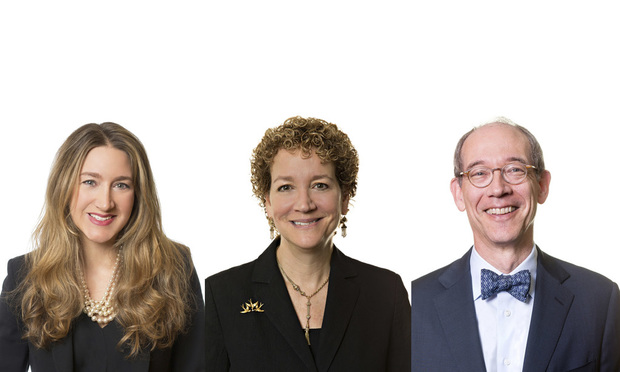How Drama Is Helping Dechert Shrink Its Gender Gap
Firm leaders credited two outside interventions, including from a theater-based organization called Steps, for a shift that has included an influx of new women partners.
August 14, 2019 at 04:30 PM
6 minute read
 (Left to right) Alison Bernard, Abbi Cohen and Andrew Levander, with Dechert. (Courtesy photos)
(Left to right) Alison Bernard, Abbi Cohen and Andrew Levander, with Dechert. (Courtesy photos)
When Dechert unveiled a new parental leave policy in 2018, expanding its allowance for both men and women while knocking down distinctions between attorneys and business service professionals, leaders wanted to make sure that managers within the firm took the right message.
So they turned to Steps, a London-based organization they’d been using since earlier that year that harnesses dramatic performance to teach lessons about unconscious bias.
Partners gathered in person and via video link to watch an actor playing a young male associate, newly staffed to an appealing project, tell his supervisor that he was planning on taking leave when his domestic partner had a child in several months.
The actor playing the firm partner offered congratulations. Then he inquired about the duration, and then laughed out loud when he learned the associate planned on taking the full 12 weeks he was allotted. “No, really,” he said.
Informed that was really the plan, the partner recovered and said all the right things. But, as New York-based Dechert chief talent officer Alison Bernard explained, if that scenario really happened, “this associate is not going to feel like he should be taking those 12 weeks.”
Indeed, many of the dramas enacted by Steps, which has also done work for law firms including DLA Piper, Allen & Overy and Reed Smith, are rooted in scenarios that actually unfolded at Dechert.
The first step after they were brought on board was to perform an opening evaluation.
“They concluded that we are basically a good firm—without outliers engaged in inappropriate behavior—but that we had a lot of implicit bias on things,” said Dechert chairman Andrew Levander.
“They also concluded that like the industry, we faced the issue of implicit bias: Do people more comfortably select Bob over Joanie to work on a matter? Those are the kind of things that we need to grapple with and we are grappling with,” he continued.
To hear New York-based Levander tell it, the ongoing Steps training, on the heels of a global diversity assessment at the start of the decade, is helping to drive an internal transformation. And the transformation, in turn, has been reflected in 13 female attorneys arriving via lateral hires in the last 15 months.
That surge helped boost the global firm’s score for female equity partners in The American Lawyer’s A-List rankings. In the current calendar year, eight out of 11 lateral hires have been women. Additionally, the firm boasts eight women practice group or industry leaders. Five of its 26 offices around the globe are helmed by women.
For Levander, being part of a high-powered professional couple has helped drive home the particular challenges that women in the cohort between 35 and 65 have in achieving the elusive goal of “work-life balance.” His wife, Carol Loewenson, is a renowned architect who served as the president of the American Institute of Architects’ New York chapter.
“When the long hours set in and you’re trying to raise children, if you don’t have a spouse who is fully there to help, it’s very hard,” he said. “The firms in Big Law have started to recognize that better by giving paternity leave, work at home, and all those things which will give both men and women—but particularly women—a better shot at getting up the ladder.”
Connecting With Clients
Dechert deputy chair for diversity Abbi Cohen has personally felt the shift within the industry, and within the firm. When she was made partner in 1992, she became just the 13th woman to earn the status at Dechert. That’s the same number of female partners the firm has added since April 2018.
She places the impetus for the transformation even farther back in time. In 2011, an outside consultant implemented a diversity assessment that culminated in the creation of a task force including partners across the U.S.
“We developed a list of tasks and action items to help us improve where we were on diversity, as a continuation of our self reflection aimed at transforming us into a more diverse and inclusive firm,” said Philadelphia-based Cohen.
As one immediate consequence, the firm also launched its internal global women’s initiative, led initially by Cohen in Philadelphia and former London partner Miriam Gonzalez. The current leaders of the initiative, partners Sabina Comis in Paris and Amanda DeBusk in Washington, joined the firm in 2016 and 2018, respectively.
Levander said that diversity has increasingly become part of the discussion when it comes to identifying laterals to pursue.
“Our clients aren’t all white males and are rapidly changing to not be a majority of white males. I’m very friendly with many general counsels of financial institutions and companies across the world, particularly in the U.S. They’re speaking and we’re responding,” he said.
“I think it’s the right thing anyway. Even if you’re callous and don’t think of any of these things, it’s a big imperative to be able to present a diverse array of people to help on the client’s most difficult problems,” he continued. “It doesn’t mean we don’t hire white males, but when you’re thinking about and deciding about who’s going to be a good partner, you take everything into account.”
Levander also acknowledged that firms take risks when they elect partners from within and hire away promising young attorneys from elsewhere.
“Some people were established stars, but we’ve also taken bets on some younger lawyers, who were laterals or promotions,” he said. “That some of them are women is an added bonus.”
Even considering that wrinkle, there’s a distinction between identifying rising talent who’ve thrived elsewhere and creating the conditions for women to flourish as associates in a firm. Cohen pointed to Dechert’s Sponsorship and Sustained Support program, launched in 2015, designed to help female associates navigate the path to partnership. In the five years before the program’s start, women benefited from 18% of partnership promotions; since its start, the figure is up to 26%.
But the high-profile laterals can help too. Take Sheila Birnbaum, the “Queen of Toxic Torts,” who joined Dechert from Quinn Emanuel Urquhart & Sullivan last May. Levander sees associates walking down the hall in the New York office and asking her for 10 minutes, but getting 15 or more.
“Having women on the team that are integrated well: these are good resources for our younger women,” Cohen said.
Read More
Are Parental Leave Policies Innovative or Just Expected Now?
Can ‘Virtual’ Law Firms Help Close the Partner Gender Gap?
The Fight for Gender Equity Will Be a Long Slog if These Numbers Hold
This content has been archived. It is available through our partners, LexisNexis® and Bloomberg Law.
To view this content, please continue to their sites.
Not a Lexis Subscriber?
Subscribe Now
Not a Bloomberg Law Subscriber?
Subscribe Now
NOT FOR REPRINT
© 2025 ALM Global, LLC, All Rights Reserved. Request academic re-use from www.copyright.com. All other uses, submit a request to [email protected]. For more information visit Asset & Logo Licensing.
You Might Like
View All
'None of Us Like It': How Expedited Summer Associate Recruiting Affects Law Students and the Firms Hiring Them

Latham's Lateral Hiring Picks Up Steam, With Firm Adding Simpson Practice Head, Private Equity GC
3 minute read

Leaning Into ‘Core’ Strengths, Jenner’s Revenue Climbs 17%, Profits Soar 23%
4 minute readTrending Stories
- 1Thursday Newspaper
- 2Public Notices/Calendars
- 3Judicial Ethics Opinion 24-117
- 4Rejuvenation of a Sharp Employer Non-Compete Tool: Delaware Supreme Court Reinvigorates the Employee Choice Doctrine
- 5Mastering Litigation in New York’s Commercial Division Part V, Leave It to the Experts: Expert Discovery in the New York Commercial Division
Who Got The Work
J. Brugh Lower of Gibbons has entered an appearance for industrial equipment supplier Devco Corporation in a pending trademark infringement lawsuit. The suit, accusing the defendant of selling knock-off Graco products, was filed Dec. 18 in New Jersey District Court by Rivkin Radler on behalf of Graco Inc. and Graco Minnesota. The case, assigned to U.S. District Judge Zahid N. Quraishi, is 3:24-cv-11294, Graco Inc. et al v. Devco Corporation.
Who Got The Work
Rebecca Maller-Stein and Kent A. Yalowitz of Arnold & Porter Kaye Scholer have entered their appearances for Hanaco Venture Capital and its executives, Lior Prosor and David Frankel, in a pending securities lawsuit. The action, filed on Dec. 24 in New York Southern District Court by Zell, Aron & Co. on behalf of Goldeneye Advisors, accuses the defendants of negligently and fraudulently managing the plaintiff's $1 million investment. The case, assigned to U.S. District Judge Vernon S. Broderick, is 1:24-cv-09918, Goldeneye Advisors, LLC v. Hanaco Venture Capital, Ltd. et al.
Who Got The Work
Attorneys from A&O Shearman has stepped in as defense counsel for Toronto-Dominion Bank and other defendants in a pending securities class action. The suit, filed Dec. 11 in New York Southern District Court by Bleichmar Fonti & Auld, accuses the defendants of concealing the bank's 'pervasive' deficiencies in regards to its compliance with the Bank Secrecy Act and the quality of its anti-money laundering controls. The case, assigned to U.S. District Judge Arun Subramanian, is 1:24-cv-09445, Gonzalez v. The Toronto-Dominion Bank et al.
Who Got The Work
Crown Castle International, a Pennsylvania company providing shared communications infrastructure, has turned to Luke D. Wolf of Gordon Rees Scully Mansukhani to fend off a pending breach-of-contract lawsuit. The court action, filed Nov. 25 in Michigan Eastern District Court by Hooper Hathaway PC on behalf of The Town Residences LLC, accuses Crown Castle of failing to transfer approximately $30,000 in utility payments from T-Mobile in breach of a roof-top lease and assignment agreement. The case, assigned to U.S. District Judge Susan K. Declercq, is 2:24-cv-13131, The Town Residences LLC v. T-Mobile US, Inc. et al.
Who Got The Work
Wilfred P. Coronato and Daniel M. Schwartz of McCarter & English have stepped in as defense counsel to Electrolux Home Products Inc. in a pending product liability lawsuit. The court action, filed Nov. 26 in New York Eastern District Court by Poulos Lopiccolo PC and Nagel Rice LLP on behalf of David Stern, alleges that the defendant's refrigerators’ drawers and shelving repeatedly break and fall apart within months after purchase. The case, assigned to U.S. District Judge Joan M. Azrack, is 2:24-cv-08204, Stern v. Electrolux Home Products, Inc.
Featured Firms
Law Offices of Gary Martin Hays & Associates, P.C.
(470) 294-1674
Law Offices of Mark E. Salomone
(857) 444-6468
Smith & Hassler
(713) 739-1250










